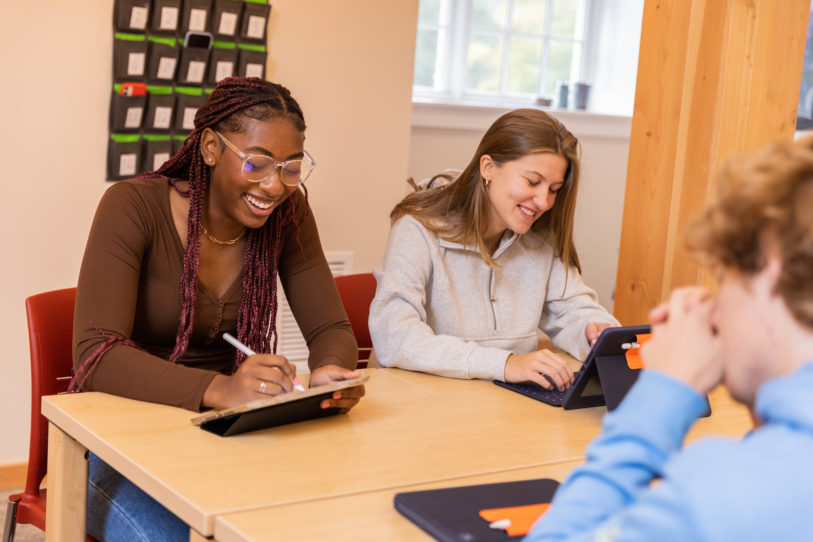Arriving just before winter break, exam study period and exam week can be stressful—the season’s excitement, the start of winter athletics, and holiday anticipation can make it challenging to settle in for a night of studying. However, New Hampton School students are well-prepared for the upcoming exam period with a review period and some helpful tips as they reach the end of this semester’s academics.
After months of projects, conversations, and dedicated class time, our exam period reviews the cumulative understanding of students in the form of assessments. Working in partnership, teachers and students will find success and feel proud of all of the learning since our start in September. Studying is not always the solitary experience one might expect, and students can find support through their classmates and consistent, planned study periods. Read on for helpful study tips.
Also, check out music recommendations from our community on this Spotify Study Session Time playlist, or take it from Dr. Duncan and check out the Chillhop channel on Youtube or Spotify (their new winter essentials playlist is out!) One of our students highly recommends listening to brown noise for focus—no words, all sounds to help you relax, focus, and engage in your work. And when you’re ready for a break—check out these de-stressing activity suggestions.

Study with purpose.
Studying should be deliberate and focus on the skills and knowledge students will be asked to demonstrate during their assessment. Rather than saying, “I’m going to study my Spanish vocab,” a student should focus their studying and instead say, “I am going to memorize the spelling and definition of ten words.”
Study the same material more than once.
The information transferred from short to long-term memory will become lasting knowledge. Once students study their ten Spanish vocabulary words, they should revisit those same words as they add ten new ones. This helps move information from short-term to long-term memory.
Make a plan.
Break down the sections you want to prepare for in each exam and plan when to study each section. For example, “In preparation for my Spanish exam on Monday, I will review vocabulary. On Tuesday, I will review grammar. And on Wednesday, I will practice speaking.” This helps to provide focus again and break down a big task into manageable sections.

Find tools for feedback while studying.
Many New Hampton School teachers use formative assessment tools throughout their teaching. These tools are helpful when studying to make sure you are focusing on the correct material. Apps such as Quizlet and Kahoot can be used. Studying with a partner and quizzing each other is another strategy. Also, as teachers provide practice exams, they also review the correct answers in class to provide students with helpful feedback. Be sure to check past assignments and quizzes.
Space out your study sessions.
This tip reemphasizes the suggestions to make a plan and review it more than once. It can be tricky with a busy schedule to find time for studying, but planning and giving your brain time to digest material can result in greater learning.
Say it aloud.
Quizzing oneself on new material, such as reciting it aloud from memory, or trying to tell a friend or a houseparent about it, is a far more powerful way to master information than just re-reading it. Once you’ve had time to review the material, find a friend to work through it aloud.





